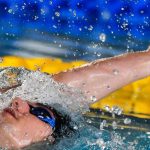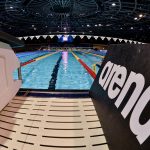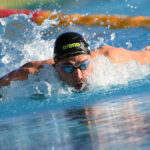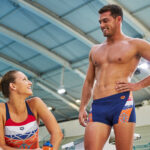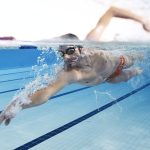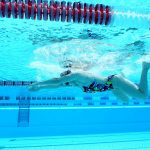Training in a 25 m pool and racing in a 50 m pool?! Here is how you do it!
The short-course pool (25 m) and long-course pool (50 m) are two completely different things. In a perfect world, every club/athlete should have the chance to train in either a short-course or long-course pool as they see fit. Of course the best preparation for racing in a long-course pool is to train in one, but lots of clubs/swimmers never get the chance to train in a 50 m pool. So what is the best way to train in a 25 m pool ready to race in an Olympic-size pool?
Here are some tips to make it easier to adapt to a 50 m pool.
1. Work on your technique. Technique should be the main focus of your training. It is important to correct technical flaws during your first training sessions. This will help you when swimming in an Olympic-size pool. Indeed, you will have twice as many problems racing in a 50 m pool if you do not have the right technique.
An efficient swimming technique will not just mean less physical issues it will also increase your strength and endurance. Training in a short-course pool allows swimmers to improve their turns, underwater phases and kicks off the wall, thereby allowing them to focus on swimming perfectly in the 50 m pool. Working on your technique is vital for top performances in a 50 m pool.
Reread our previous articles and you will find some interesting technique drills to include in your daily training sessions.
2. Train your aerobic base. Along with technique, aerobic training is the very foundation of success. Aerobic training in a short-course pool will help you adapt to a 50 m pool that requires greater energy expenditure.
There are inevitably certain differences in aerobic training in a short-course pool and a 50 m pool. Most of the differences lie in the length and volume of training. Whereas aerobic work in a short course pool lasts 45 minutes, it can be as long as an hour in an Olympic-size pool. Sets will involve longer reps (e.g. over 200 m) and there will also be speed work, so that the swimmer gets used to changes in pace that are so important in a 50 m pool.
Here is a training session for a 50 m pool:
- 2 x 400 medley, 1 x change stroke after 25 m 1 x chance stroke after 50 m, 30” rec.
- 2 x 100 freestyle at aerobic pace, 10” rec.
- 2 x 50 any style, 20” rec.
- 2 x 300 freestyle, 1 x fast 1 x pullbuoy and hand paddles, 30” rec.
- 4 x 100 freestyle at aerobic pace, 10” rec.
- 2 x 50 any style, 20” rec.
- 2 x 200 freestyle, 50 complete stroke/50 technique, 20” rec.
- 6 x 100 freestyle at aerobic pace, 10” rec.
3. Train your legs. This is probably the part of the body most affected by the transition from a short-course pool to a long pool. Even though there are fewer underwater phases, the volume of leg work must not be decreased. Maintaining a heavy work load is vital for finishing races strongly.
Here is a session combining intensive leg work with aerobic swimming:
- 1x 400 freestyle with 100 legs/100 complete stroke, 30” rec.
- 1 x 100 recovery
- 4 x 200 freestyle with 100 legs/100 complete stroke, 20” rec.
- 1 x 100 recovery
- 8 x 100 freestyle 50 legs/50 complete stroke, 20” rec.
The short recovery periods force you to work hard during both parts of the session. After using your legs intensively during the first part, you are forced to swim the second part with tired legs. The high number of leg reps guarantees a solid endurance base for your legs.
Here are two valuable tips to finish with: 1. If you get the chance, race in a 50 m pool even if you train in a 25 m pool. This will help you get used to the 50 m pool and allow you to make the necessary adjustments for future training sessions. 2. Do not change your training plan too much. Technique, the aerobic base and leg work must be the main focuses of your training in both short and long pools.
—————
Written by:
arena coaches
Swim coaches, trainers and experts will give you all kinds of tips for performing at your best in both training and races.
